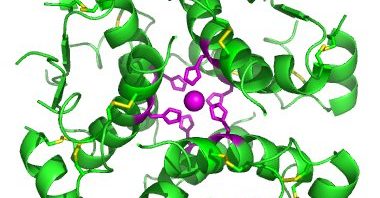Most people are aware that insulin plays a very important regulatory role within our body. As glucose levels rise within the body, insulin is responsible for breaking the glucose down and turning it into glycogen, thus lowering the levels of glucose within the body and avoiding hyperglycemia. But, insulin also plays many other important roles, specifically within the central nervous system (CNS). It has effects on reproduction, cell proliferation and differentiation, neuro-protective effects, and cognition and memory.
 When I first learned that insulin plays a role in reproductive regulation, I was surprised. It does not have a direct role in regulating reproduction, but rather is a contributing factor. Insulin is able to contribute to the control between the reproductive function and metabolic actives that take place during fertility. When the hypothalamus is perfused with low concentrations of insulin, it leads to a stimulatory effect on GnRH secretions. So, insulin has somewhat of a regulatory effect on the reproductive cycle, but other hormones play a larger role within the CNS. (Please refer here for further information on the reproductive cycle)
When I first learned that insulin plays a role in reproductive regulation, I was surprised. It does not have a direct role in regulating reproduction, but rather is a contributing factor. Insulin is able to contribute to the control between the reproductive function and metabolic actives that take place during fertility. When the hypothalamus is perfused with low concentrations of insulin, it leads to a stimulatory effect on GnRH secretions. So, insulin has somewhat of a regulatory effect on the reproductive cycle, but other hormones play a larger role within the CNS. (Please refer here for further information on the reproductive cycle)
Insulin also contributes to cell proliferation and differentiation. Insulin increases the levels of ornithine decarboxylase within the CNS, which is an indicator of growth stimulation. It also increases the proliferation of astrocytes, which are supporting cells within the CNS. Lastly, it is able to contribute to the increased stimulation of the PI3K-AKT pathway, which is a pathway that contributes to neuritis growth along with an increase of synaptogenesis. In combination, all three of these stimulatory effects will increase cell growth within the CNS.
Another function of insulin within the CNS is its contribution to cognition and memory. Through an increase of insulin within the hippocampus, improvements in both memory and learning processes have been observed. This is indicated by an increase of insulin receptor (IR) expression and an increase of signal transduction pathways within the hippocampus. Memory is formed through the modulation of long-term potentiation (LTP) and long-term depression (LTD) events. Insulin is able to modulate gluatamatergic neurotransmission at the synapses in order to contribute to this delicate balance by inducing LTD events, therefore contributing to the increase of memory.
One last function that insulin has within the CNS is its neuro-protectivity. Insulin is able to protect against apoptosis, beta amyloid toxicity, oxidative stress, and ischemia. By producing ATP during glycolysis, insulin is able to counteract events that would otherwise produce oxidative stress within the cell. Also, through the stimulation of the PI3K-AKT-mTOR pathway, insulin stimulates growth within the CNS. Through the protein p70SK, one of the downstream targets of the mTOR pathway, insulin is able to avoid apoptotic events. It also is able to avoid cell death through the protection against the formation of beta-amyloid fibrils, which is potential target for the regulation of beta-amyloid plaque formation. These plaques are also found in diseases such as Alzheimer’s and Parkinson’s Disease.
Insulin has far more roles than what most people would think. It is intriguing how one molecule can have effects on so many different processes throughout the CNS. Just being aware of some of its other functions can bring more appreciation for the molecule!
Insulin’s Role in the CNS
